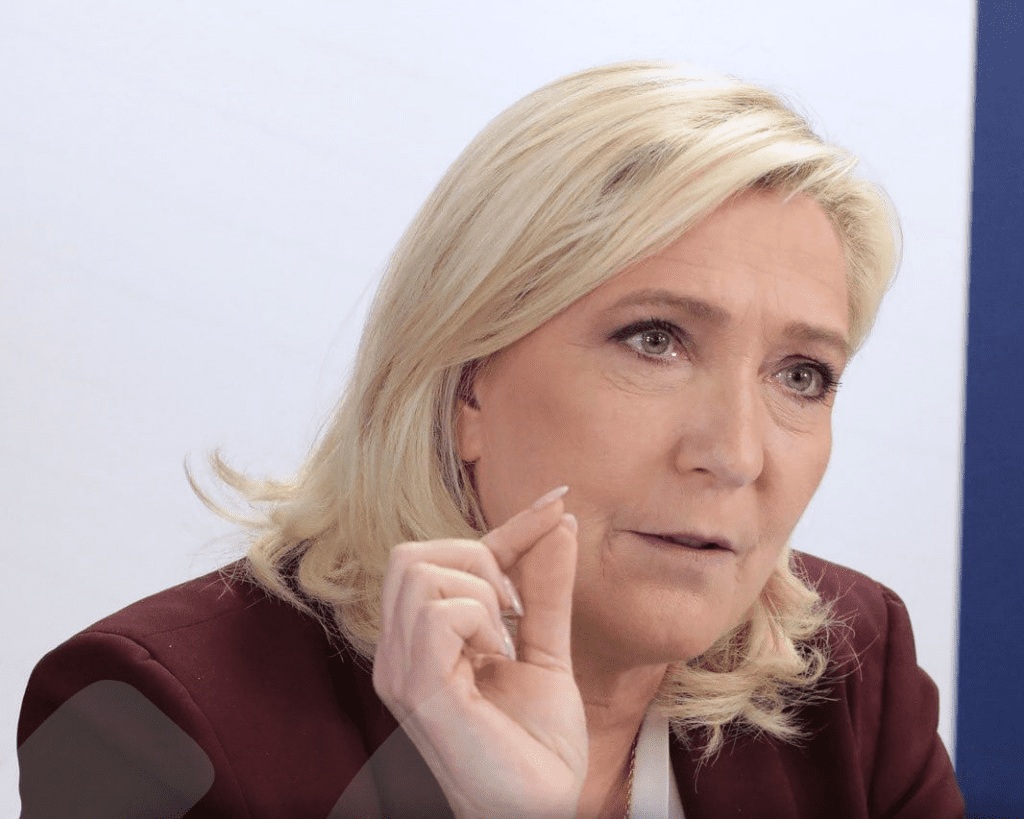Marine Le Pen is running for the third time in the French presidential election. In 2011, she took over the presidency of the Front National party founded by her father, Jean-Marie Le Pen, in 1972, before renaming it Rassemblement National in 2018. Her party has embodied a national and sovereignist platform for the Right in France for over fifty years.
In this election, she finds herself competing with the polemicist Éric Zemmour, who is entering politics for the first time, and whose tone and methods she challenges. Her campaign was grounded on the traditional themes of the Rassemblement National—immigration and security—but has branched out toward the more popular electorate, to her advantage. Several media rallies of personalities who veered from her party towards Éric Zemmour’s—her niece Marion Maréchal, for example—did not fundamentally affect her electoral momentum, which makes her today the most serious opponent of Emmanuel Macron. She agreed to answer exclusive questions for The European Conservative.
Marine Le Pen is running for the third time in the French presidential election. In 2011, she took over the presidency of the Front National party founded by her father, Jean-Marie Le Pen, in 1972, before renaming it Rassemblement National in 2018. Her party has embodied a national and sovereignist platform for the Right in France for over fifty years.
In this election, she finds herself competing with the polemicist Éric Zemmour, who is entering politics for the first time, and whose tone and methods she challenges. Her campaign was grounded on the traditional themes of the Rassemblement National—immigration and security—but has branched out toward the more popular electorate, to her advantage. Several media rallies of personalities who veered from her party towards Éric Zemmour’s—her niece Marion Maréchal, for example—did not fundamentally affect her electoral momentum, which makes her today the most serious opponent of Emmanuel Macron. She agreed to answer exclusive questions for The European Conservative.
Indeed, the word “conservative” does not have a very good reputation in France. It’s not in our political tradition, that’s just the way it is! Therefore, it is not a term that I like to use… Yet there is one thing that seems obvious to me: if there is one thing to conserve, it is France.
For many years now, we at the Rassemblement National have sought to maintain good relations with partner parties in other European countries with which we have much in common: we each defend the love of our respective countries. We are attached to our sovereignty and our identity, against the encroachments of a European Union that does not respect the people. The example of the attacks against Hungary and Poland is extremely emblematic: governments are attacked, even though they were democratically elected, because they have projects that do not fit in with the progressive agenda of the Union. We cannot accept this. I was particularly proud and touched to be able to count on the support of Viktor Orbán, Matteo Salvini, and André Ventura on the day of our big meeting in Reims. They prove that our fight is not in vain and that we are not alone! I think that today we will not be able to make things happen in Europe without a constructive alliance of free nations. The peoples of Europe expect something else from the future than to perish under Brussels’ technocracy.

I would like to know what concessions to the system we are talking about! Is it because I am concerned about the purchasing power of the French? Some people do reproach me for that. The truth is that the basis of my convictions has not changed. I believe in France; I dedicate every second of my life to the happiness of the French people, who are the top priority in all my battles. I believe in controlling our borders. I want to establish a national priority for employment and housing. I believe in family; I believe in our roots. On the other hand, it is obvious that there are outrages of speech and a kind of aggressiveness that I cannot tolerate—simply because they lead nowhere.
I think that we should not reduce the question of identity and of the pride we can legitimately have for our country to the question of immigration, even if it is obviously central. We have an extraordinary legacy in our hands: French culture. This is the real cement of this “living together” (vivre-ensemble) which is too often abstract and fantasised by the left. We must therefore promote it, keep it alive by preserving the heritage and by involving the younger generations. I would like to establish a national heritage service, because I am convinced that young people only want to love and serve our castles, our churches—which make our beautiful country so envied throughout the world.
Of course there is a European culture… it is probably only the officials of the Commission who forget that it exists! For me, European culture is first and foremost a heritage, the Judeo-Christian heritage, Greece and Rome—ancient Rome and Christian Rome. A unity of values and references that link together the most beautiful human achievements of our continent: the dignity of the human person, the dignity of women, the rule of law. But it is also the people who embody it: Dante, Shakespeare, Goethe, or Hugo are European only because they are deeply rooted in their respective national histories. It is because there is a European culture that there can be a European policy. It is a culture that is received and transmitted, and not a voluntaristic culture of a project, abstract and which does not speak to the heart of Europeans.
